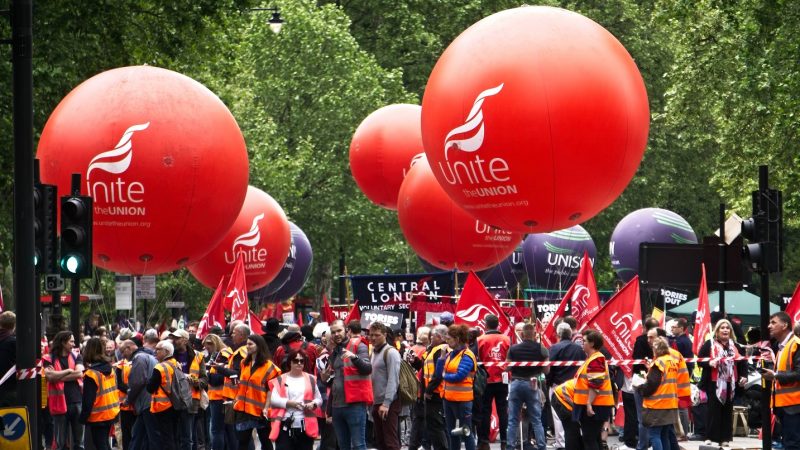'Any political party seeking to avoid long-term economic stagnation and social disorder needs to do two things - increase workers’ share of GDP and reduce capital’s share.'

Prem Sikka is an Emeritus Professor of Accounting at the University of Essex and the University of Sheffield, a Labour member of the House of Lords, and Contributing Editor at Left Foot Forward.
Millions of Brits are being condemned to a life of poverty and insecurity. Despite economic growth over the last 16 years, the real average wage is lower than what it was in 2007. Out of a population of 68 million, around 14.4 million live in poverty, including 4.2 million children. Nearly 3 million people, including nurses, teachers, police, rely upon foodbanks for their survival. Average life expectancy is shrinking.
The government has imposed real wage cuts on public sector workers and the private sector workers are also receiving real pay cuts. Around half of the 7.25 million gig economy workers are earning less than the statutory minimum wage, blighting their chances of good food, housing, education, healthcare, education, pension, security and life chances. People are struggling to pay household bills, but the UK has record 177 billionaires. The median billionaire has around £2bn of wealth
Profits at banks, food, energy, water, transport and other companies have soared. Profit margins at FTSE350 companies for the first half of 2022 were 89% higher compared to 2019. Profits of the big eight shipping firms increased by 20,650%; oil refineries, 366%; food (agribusiness), 255%; and hardly a day passes without industries declaring record profits, which are a source of inflation and cost-of-living crisis for millions.
Why is this happening? The main reason is the right-wing coup which has intensified since the late 1970s. One of its major aims has been to restructure the state and increase the return to capital.
The state no longer has any pretence of being an even-handed adjudicator of disputes between capital and labour. It nakedly favours footloose capital. The Conservative, Liberal Democrats and the Labour party have been enrolled to this project, and are well-funded by corporate and wealthy donors. The only exception was the Jeremy Corbyn led Labour Party during 2015-2019, but in the face a hostile mainstream media and an onslaught of smears it lost the 2017 and 2019 general elections, leaving the coup to advance.
Ever since the 1980s, publicly owned industries such as water, gas, electricity, oil, mail, railways, steel, shipping, mining and more have been sold to private corporations at knockdown prices. Many (e.g. railways, energy, steel) continue to receive public subsidies. There are no curbs on corporate profiteering, a major factor in the current cost-of-living crisis. The state has become a guarantor of corporate profits as evidenced by privatisations, outsourcing of the state’s functions and the private finance initiative (PFI).
The restructuring of the state has been accompanied by an assault on workers’ rights in the belief that impoverished and exhausted workers, worried about household bills, would be less resistant to capitalist efforts to extract greater economic surpluses. In 1976, at the dawn of the coup, workers’ share of the gross domestic product (GDP), in the form wages and salaries, was 65.1%. By the end of 2022, under the onslaught of anti-trade union laws, it declined to around 50%.
Work does not pay enough to support families and people have to rely upon social security benefits to make ends meet. 41% of universal credit claimants are in work, and 68% of families living in poverty include at least one working adult.
The state’s tax take for the period 1965 to 2019 remained at around 32%-33% of GDP. So, the main beneficiary from the decline in workers’ share of GDP has been capital.
Fearful of retaliation from the working class, the government introduced The Conduct of Employment Agencies and Employment Businesses (Amendment) Regulations 2022, which enables employers to replace striking workers with cheaper agency staff. The Strikes (Minimum Service Levels) Bill would make it almost impossible for workers to take strike action. It requires trade unions to break lawfully organised strikes. Workers refusing to break strikes would lose their jobs and trade unions face massive financial penalties. Senior Conservatives want to repeal or severely weaken laws relating to minimum wage, equal pay, holiday pay and maternity rights The Retained EU Law (Revocation and Reform) Bill enables the government to dismantle the above and more rights secured after decades of campaigning. The working class is further disciplined by The Public Order Act 2023 which has criminalised “noisy” protests and people can be arrested on the basis that they might cause disruption. Journalists reporting on the possibility of disruption have been arrested.
The coup has enriched a few, but impoverished millions. Its success is now a threat to the long-term interests of capital itself and the wellbeing of the country. Companies and political parties advocate economic growth, but an impoverished working and middle class does not have the economic strength to finance it.
Any political party seeking to avoid long-term economic stagnation and social disorder needs to do two things – increase workers’ share of GDP and reduce capital’s share. These interrelated objectives require redistribution of income and wealth, higher real wages, curbs on profiteering and higher taxes on capital and the ultra rich. It is doubtful that major political parties will free themselves from the golden shackles of corporations and the rich to provide emancipatory change. This in turn creates space for people to form new organisations to ferment change.
Image credit: Garry Knight – Creative Commons
To reach hundreds of thousands of new readers we need to grow our donor base substantially.
That's why in 2024, we are seeking to generate 150 additional regular donors to support Left Foot Forward's work.
We still need another 117 people to donate to hit the target. You can help. Donate today.



